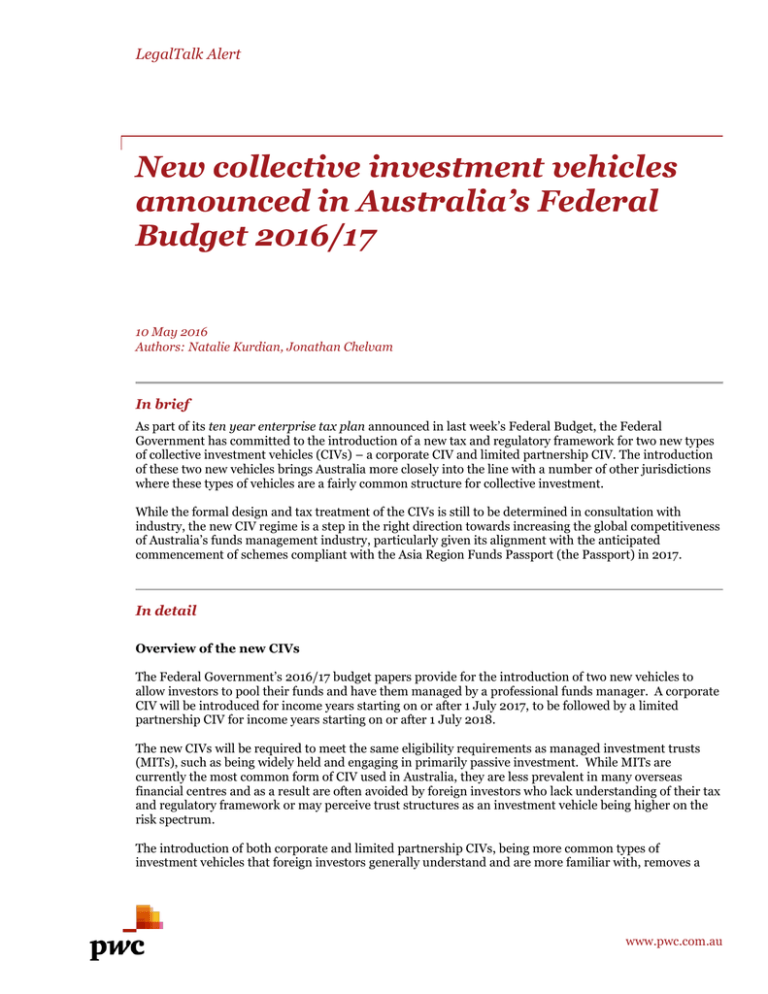
LegalTalk Alert
New collective investment vehicles
announced in Australia’s Federal
Budget 2016/17
10 May 2016
Authors: Natalie Kurdian, Jonathan Chelvam
In brief
As part of its ten year enterprise tax plan announced in last week’s Federal Budget, the Federal
Government has committed to the introduction of a new tax and regulatory framework for two new types
of collective investment vehicles (CIVs) – a corporate CIV and limited partnership CIV. The introduction
of these two new vehicles brings Australia more closely into the line with a number of other jurisdictions
where these types of vehicles are a fairly common structure for collective investment.
While the formal design and tax treatment of the CIVs is still to be determined in consultation with
industry, the new CIV regime is a step in the right direction towards increasing the global competitiveness
of Australia’s funds management industry, particularly given its alignment with the anticipated
commencement of schemes compliant with the Asia Region Funds Passport (the Passport) in 2017.
In detail
Overview of the new CIVs
The Federal Government’s 2016/17 budget papers provide for the introduction of two new vehicles to
allow investors to pool their funds and have them managed by a professional funds manager. A corporate
CIV will be introduced for income years starting on or after 1 July 2017, to be followed by a limited
partnership CIV for income years starting on or after 1 July 2018.
The new CIVs will be required to meet the same eligibility requirements as managed investment trusts
(MITs), such as being widely held and engaging in primarily passive investment. While MITs are
currently the most common form of CIV used in Australia, they are less prevalent in many overseas
financial centres and as a result are often avoided by foreign investors who lack understanding of their tax
and regulatory framework or may perceive trust structures as an investment vehicle being higher on the
risk spectrum.
The introduction of both corporate and limited partnership CIVs, being more common types of
investment vehicles that foreign investors generally understand and are more familiar with, removes a
www.pwc.com.au
natural barrier for foreign investment and increases the attractiveness of inbound investment in
Australian managed funds. While this is an obvious motive behind introduction of the new CIVs, it is
intended that they not be limited to attracting capital from only foreign investors.
Alignment with commencement of the Passport
Introduction of the new CIV regime from 1 July 2017 is intended to align with commencement of the
Passport, with the recently signed Passport Memorandum of Cooperation (“MOC”) between Australia,
Japan, Korea and New Zealand expecting to result in the first Passport-compliant schemes being offered
by participating economies in 2017.
The Passport is an international initiative that seeks to create a common framework to reduce regulatory
inconsistency and overlap faced by collective investment scheme operators offering schemes in multiple
jurisdictions. This facilitates the cross-border offering of eligible collective investment schemes while
ensuring investor protection in participating jurisdictions. For further information on the Passport,
please refer to our publication Asian Passports, the coming of age.
Introduction of the new CIVs will inherently improve the effectiveness of the Passport from an Australian
perspective by allowing Australian fund managers to offer a broader range of CIVs, particularly those that
foreign investors may be more familiar with. With USD 4.5 trillion assets under management as at June
2015, the Asian Region is an important growth area for funds management and one that Australian funds
can get better exposure to following commencement of the new CIV regime in conjunction with the
Passport.
Expected form and tax treatment
The formal design of the new CIVs has not yet been determined and is expected to require detailed
consultation between Treasury and industry to develop, particularly in light of current corporations and
partnership laws. The draft Passport rules also require detailed consideration and possible amendment to
ensure the new CIVs are not excluded from the concept of a ‘collective investment scheme’. It is worth
noting that the current statutory regime for publicly offered investments in Australia does not provide for
the operation of certain alternative forms of collective investment vehicles that are common in overseas
jurisdictions such as UCITS )Undertaking for Collective Investment in Transferable Securities) funds that
currently operate under the EU directive. A UCITS investment structure cannot be registered as a
managed investment scheme under the Corporations Act, as the UCITS structure does not include the
equivalent of the single responsible entity. Additionally, the UCITS Directive constitutes a prescriptive
regulatory regime, where structural requirements for a UCITS are embedded in a law for a UCITS.
Essentially, the managed investment scheme and current corporations regime for public offers in the
Corporations Act does not contain equivalent requirements.
Similar to the existing MIT structure, it is expected that both the corporate and limited partnership CIVs’
will have flow through status for tax purposes, meaning investors will generally be taxed as if they had
invested directly. However, the specific tax attributes of the new CIVs will also need to be determined in
consultation with industry, specifically with respect to the application of Australia’s withholding tax rules
to the CIVs.
Practical outcome for Australia’s funds management industry
As noted above, introduction of the new CIV regime should enhance access by the Australian funds
industry to foreign markets and allow more product choice by enabling Australian fund managers to offer
a broader range of CIVs and thereby eliminate a natural barrier for inbound investment into Australia. In
line with the broad intention of the Federal Government’s ten year enterprise tax plan, this is expected to
increase the global competitiveness of Australia’s fund management industry and lead to the realisation of
greater commercial success of the Passport from an Australian perspective.
PwC
Page 2
In addition to increasing competitiveness of the Australian funds industry, the new CIV regime also
provides an opportunity for Australia to pursue and lead innovation in the financial sector. In response to
the Financial System Inquiry conducted in late 2013, the Federal Government cited the Passport as one of
three opportunities for innovation in the financial sector. The Assistant Treasurer’s announcement of
signing of the MOC also noted the Passport as one of the latest innovative measure in funds management.
While the new CIVs provide a crucial means by which Australia can realise success of the Passport, it is
expected that new ways of connecting the users and savers of capital will emerge beyond the current MITs
and proposed CIVs. This presents an opportunity for Australia to lead innovation in funds management;
by not only striving to meet global competition but pushing the boundaries to redefine what CIVs of the
future might look like.
Let’s talk
For a deeper discussion of how these issues might affect your business, please contact:
Tim Blue
Partner, Sydney
+61 (2) 8266 0871
tim.blue@au.pwc.com
Natalie Kurdian
Partner, Sydney
+61 (2) 8266 2763
natalie.kurdian@au.pwc.com
James Delesclefs
Partner, Sydney
+61 (2) 8266 2320
james.delesclefs@au.pwc.com
Andrew Wheeler
Partner, Sydney
+61 (2) 8266 6401
andrew.wheeler@au.pwc.com
© 2016 PricewaterhouseCoopers. All rights reserved. In this document, “PwC” refers to PricewaterhouseCoopers a partnership
formed in Australia, which is a member firm of PricewaterhouseCoopers International Limited, each member firm of which is a
separate legal entity. This publication is a general summary. It is not legal or tax advice. Readers should not act on the basis of this
publication before obtaining professional advice. PricewaterhouseCoopers is not licensed to provide financial product advice under
the Corporations Act 2001 (Cth. Taxation is only one of the matters that you need to consider when making a decision on a financial
product. You should consider taking advice from the holder of an Australian Financial Services License before making a decision on
a financial product.
Liability limited by a scheme approved under Professional Standards Legislation.
PwC
Page 3

